Disney Big Hero 6 – An early preview & peek behind the scenes Big Hero 6

I had the opportunity to spend a day at the Walt Disney Animation Studio to learn about Big Hero 6. I have previously posted Part I featuring a look at “Feast” the new short that will be accompanying Big Hero 6. As well as Part II featuring a primer on Big Hero 6 looking at who, what, where, and when. In this third installment I want to share some of the interesting factoids/notes I took away from the experience. I spent the day in the Roy E Disney Animation Building, the sorcerer hat building located on the Disney lot in Burbank, CA. This is the home of the Disney Animation Studios. Pictured above is the main lobby. Big Hero 6 has taken over the walls as you enter the building and around the first floor lobby. Below are two more pictures from the first floor.
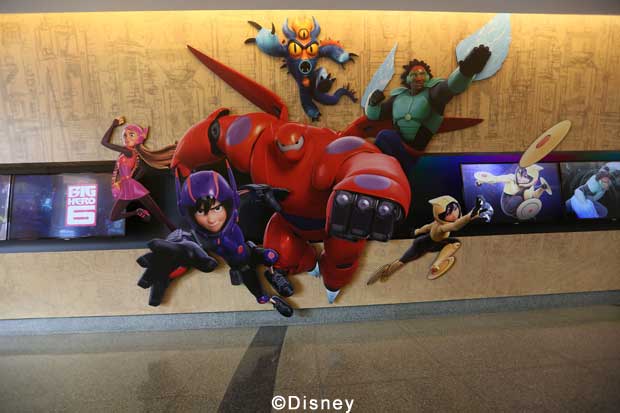
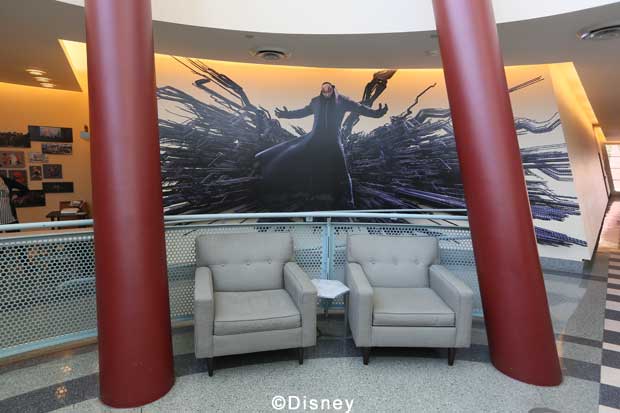
The morning started off in the theater on the first floor.
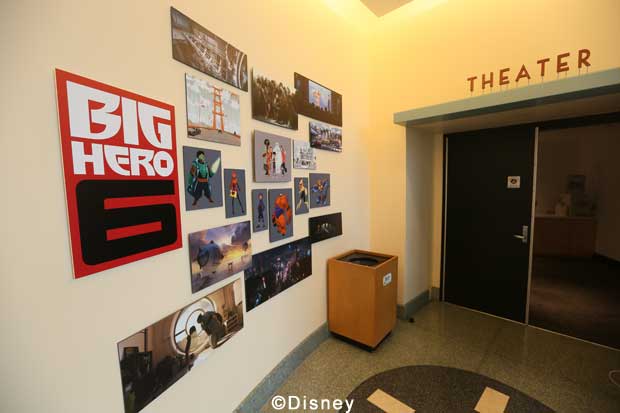
After the Feast presentation I covered in a previous posting the producer Roy Conli and directors Don Hall and Chris Williams (pictured below) introduced us to the film and characters. We were shown several clips and scenes in various stages of completion to illustrate what they were presenting. In total we saw maybe 20 minutes, they were careful not to reveal too much of the plot or key aspects, it was an extended teaser almost. Much of what was discussed was covered in my overview blog posting already.
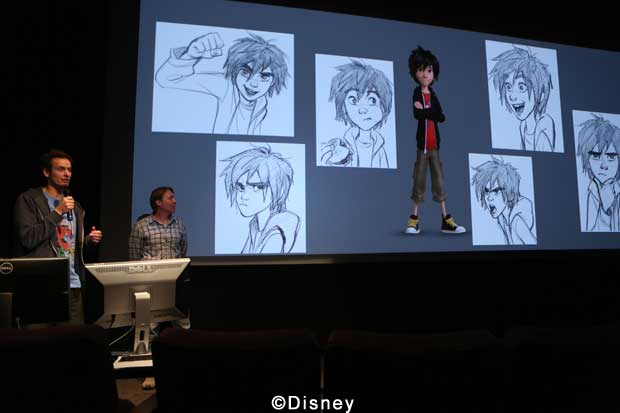
The bulk of the day consisted of five sessions looking at different aspects of putting the film together. Think DVD/Blu-ray bonus material but live, interactive and extended. The sessions took place in screening and story rooms on the second floor and third floors of the building.
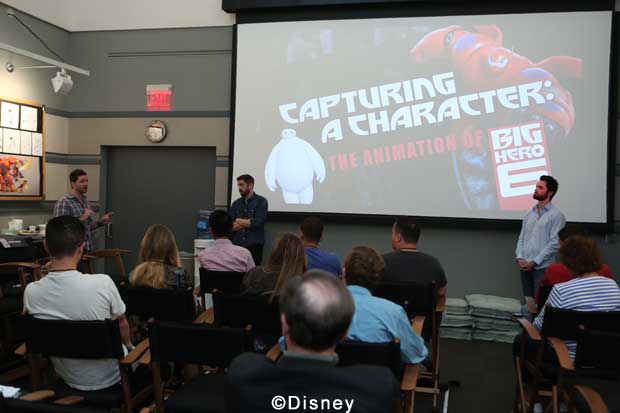
Session 1: Capturing a Character – The Animation of Big Hero 6
Description: Head of Animation Zach Parrish (“Wreck-It Ralph”) and members of his team – including legendary Disney animator Mark Henn (“Beauty and the Beast,” “Frozen”) – highlight the enormous scope of the film’s animation, from creating the biggest action sequences in Disney Animation history to richly nuanced character performances in CG.
My Notes:
- The film utilized 85 animators
- 5 animation supervisors
- Their new software allowed for crowd/background characters to be much more dynamic, more variation, and produced more efficiently. There were 701 unique characters created, 1,324 animation cycles, 632,124 retargeted cycles
- 7 action sequences more than any other Disney animated feature film
- Baymax walk modeled on a baby penguin
- The style of animation for Baymax was called unimating because the goal was to simplify his movements
- Basic steps involved in animation are – layout, animation pre-viz, live test, blocking pass, animate — gather notes and repeat as necessary for each step
- They demonstrated a way that they collect notes on the film. In real time someone can draw over the frames/scenes being screened and these notes are saved and able to be recalled later.
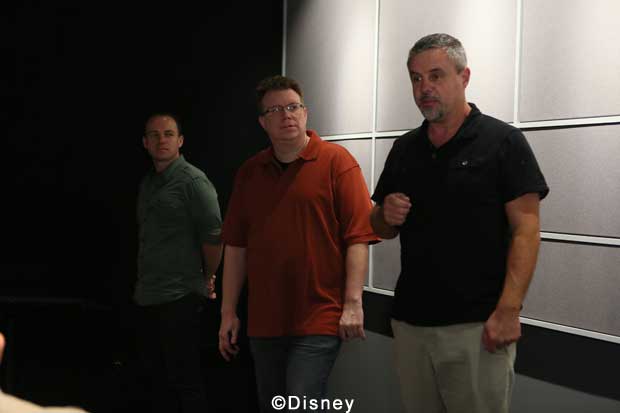
Session 2: Visual Effects
Description: On “Big Hero 6,” the visual effects artists were challenged to take this high-octane, action-packed adventure to the next level, all while creating new techniques along the way. From Wasabi’s fighting blades to Fred’s fire breathing suit, Head of Effects Michael Kaschalk and Effects Production Supervisor Nathan Curtis present the complex and varied challenges to bringing action to life.
My Notes:
- A large portion of this presentation was devoted to one of the key effects of the film, Microbots. These tiny reconfigurable robots are Hiro’s invention and play a major role. To create them and get them to move and create objects was a monumental task. In several scenes there are 20 million microbots in the shot.
- Big Hero 6 used a new rendered developed for the Disney Animation Studios called Hyperion
- As the films become more complex the need for Visual Effects continues to grow. The team at Disney Animation Studios has grown too. For comparison:
- 13 Tangled
- 31 Wreck-It Ralph
- 35 Frozen
- 40 Big Hero 6
- Part of the job of the visual effects team is to explore the science of the effects they are trying to create to understand how it is really happening so they can better model/recreate it for the films. To do this they took research trips to research labs at Universities including CMU, MIT and Harvard
- The Visual Effects team collaborates with the other teams working on the film and they even embed a member with the animation team to help ensure a constant flow of information between the two.
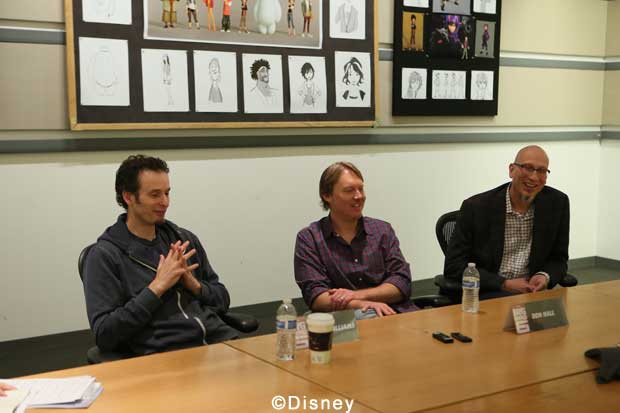
Session 3: Meet the Directors and Producer
Description: Directors Chris Williams (“Bolt”) & Don Hall (“Winnie the Pooh”) and producer Roy Conli (“Tangled”, “Treasure Planet”) answer your questions about “Big Hero 6”!
- Collaboration is the word of the day. With two directors managing a large team it was essential to creating the final product.
- One of the interesting things they learned on their research trip to Tokyo was how it keeps reinventing itself. The city keeps tearing down and rebuilding as needed. A building older than 30 years seemed really old.
- The film was set in the near future so it would be familiar but still able to push the boundaries
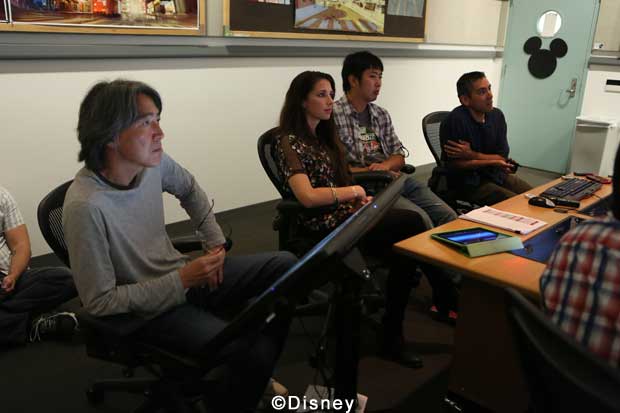
Session 4: Production Design (Jin Kim, Lorelay Bove, Shiyoon Kim, Kyle Odermatt)
Description: Join Production Designer Paul Felix and members of the visual development team as they walk through the artistic design choices and research that went into the creation of San Fransokyo and the unique character designs of “Big Hero 6.
- Lorelay Bove (Visual Development Artist) spoke about the first explorations they did for the film, including a set of Travel posters for San Fransokyo 3 years ago
- Baymax is an inflatable robot, inspired by some they saw on a research trip to CMU top learn about soft robotics
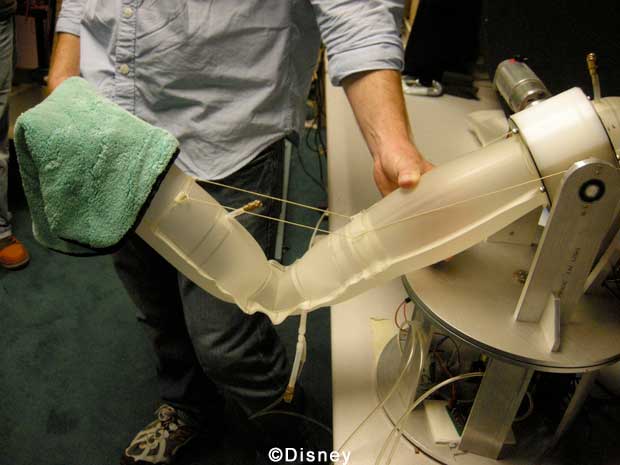
- Shiyoon Kim talked about how a lot of Hiro is based on his childhood and people he knew
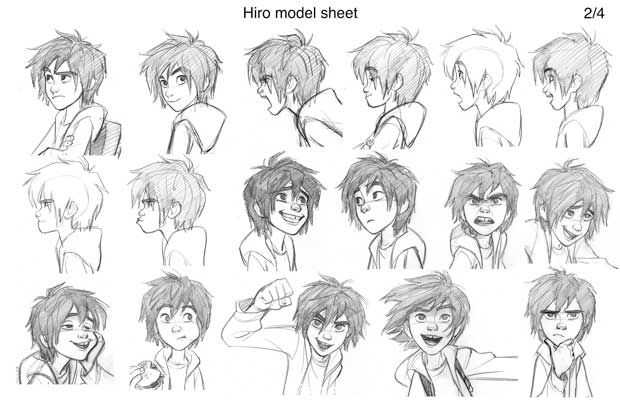
- Costume Color overview
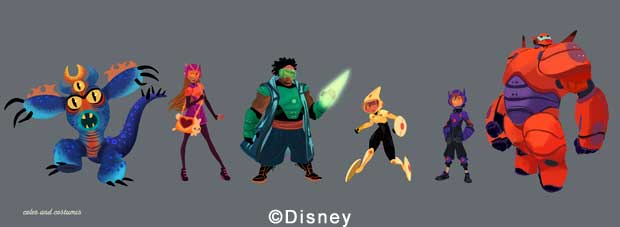
- The walked us through a sample of how a research photo can inspire a building in the film. In this case Aunt Cass’s Cafe. In the series of images below you will see a photograph of a building in San Francisco, a first exploration of what it could look like in the film, then a frame from the film.
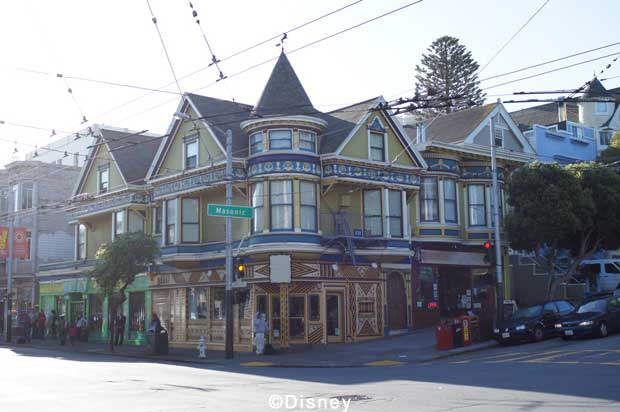
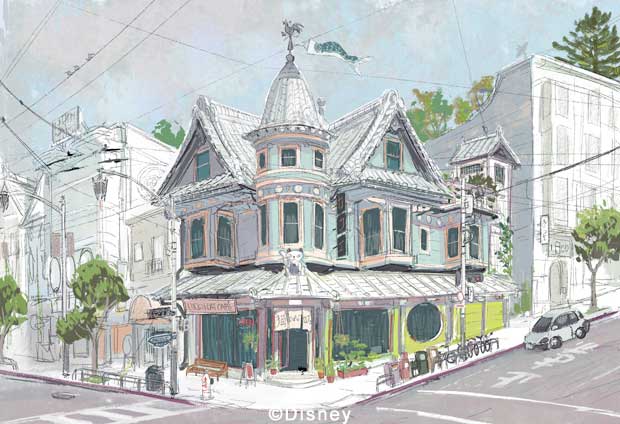
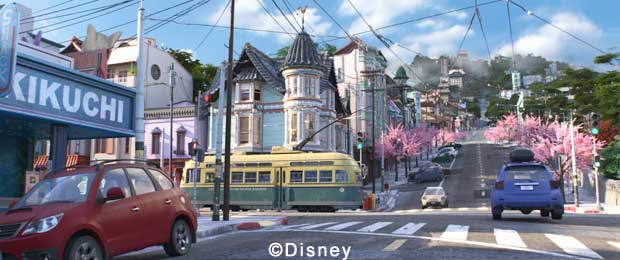
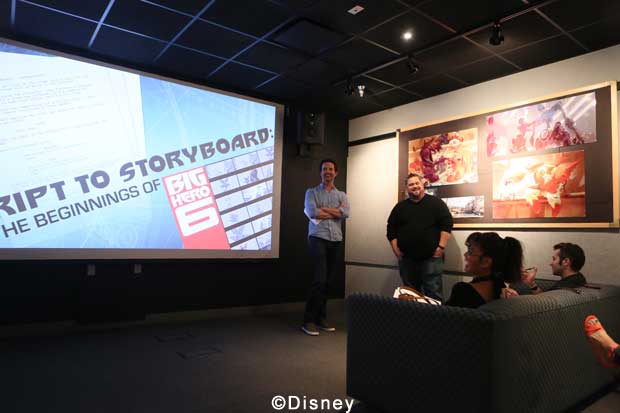
Session 5: Script & Story
Description: “Big Hero 6” Screenwriter Robert Baird and Head of Story Paul Briggs show how script and storyboards work together to bring a Disney animated feature film to the screen.
- The take away from this presentation is how long and difficult the process is to nail down the story and create the script for a film. The process begins by creating storyboard for the various sequences of the film and stringing them together. These boards can be very elaborate. Big Hero 6 had approximating 30 sequences and each took approx. 1,000 drawings to convey.
- As the boards and story take shape there are screenings along the way to check on the progress, gather feedback, etc.. typically there are about 8 major screenings over the several years of development.
- The first screening occurs approximately a year into development and is usually a complete disaster. Things that you think are working well fall flat, the audience is lost, etc.. almost everything thrown out and reworked.
- With each screening the story starts to solidify and progress. In general it really does not start to come together until the 4th screening
Note: All images on this posting are provided by Disney
